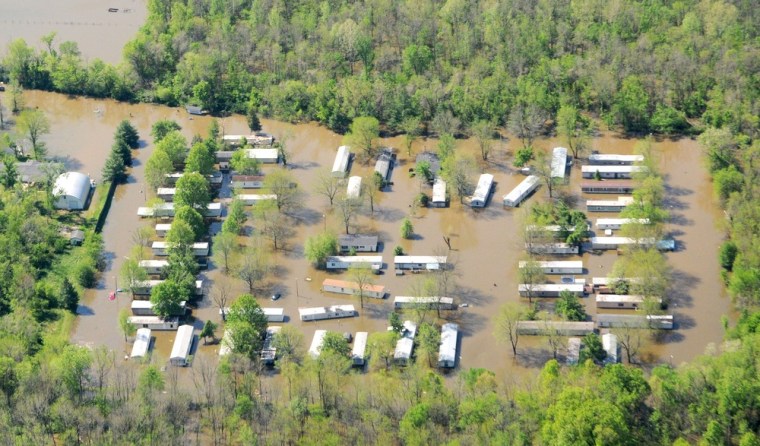A surge of water not seen since the Great Mississippi Flood of 1927 is forecast in coming days to test the enormous levees lining the Mississippi River on its course through the Deep South, adding another element of danger to a region already raked by deadly tornadoes and thunderstorms.
Louisiana and Mississippi, where at least 33 died in the storms, are under flood warnings and their governors have declared states of emergency.
Authorities along the swollen waterway in both states are warning nearby residents to brace for the possibility of any flooding.
Several thousand structures in Mississippi could be swamped by some eight feet of water by mid-May under a worst-case scenario, state officials say.
River boat casinos in Mississippi are closing and levee managers are readying sand bags and supplies — and the manpower to build the defenses — to fight the rising river along hundreds of levees in both states where the river crosses en route to the Gulf of Mexico.
"We're going to do everything we can to prepare for the worst-case scenario while we still are hoping for the best case," Louisiana Gov. Bobby Jindal said, adding the state was prepared to withstand the test.
Louisiana is still recovering from powerful Hurricane Katrina, which struck in August 2005 as levees broke under surging waters and more than 80 percent of New Orleans was flooded. Since 2005, the corps has spent billions of dollars in repairing levees and improving the city's flood protections, but the vast majority of that work has been focused on protecting the city from hurricane surge, not river flooding.
While authorities who manage the levees express confidence that those structures can withstand the enormous surge, the high waters are expected to put pressure on the levees for as many as 10 days — and that has officials concerned.
"It is going to be a slow-moving crest and what that means is it does put pressure on those levees," Jindal said.
River flooding, fed by heavy rains across the Mississippi River valley, is already a serious problem hundreds of miles upriver, particularly in Missouri where the Army Corps of Engineers is considering whether to blow up a levee to relieve pressure on Cairo, Ill., a bottleneck where the Ohio and Mississippi rivers meet.
The state of Missouri on Friday appealed a federal judge's ruling earlier in the day that gave the Corps of Engineers permission to blow up the levee, which would flood farmland but protect Cairo.
As the water makes its way downriver, the lower portion of the Mississippi will be tested.
The river is forecast to crest at 53.5 feet on May 18 at Vicksburg, Miss., a key gauge. That is the highest river stage recorded at Vicksburg since the catastrophic flooding of 1927 when the river reached 56.6 feet and would have kept on rising if levees hadn't given way, causing massive flooding and killing hundreds.
After that calamity, the nation undertook an aggressive $13 billion plan to build levees and floodways that would avert such a scale of flooding again.
The crest of the high river is expected to reach New Orleans on May 22, and Jindal said the corps was looking at opening a major spillway, the Bonnet Carre, just north of the city to relieve pressure.
Those who manage the levees built up since 1927 expressed confidence in them.
"The levees are designed to withstand 65 feet," said Robert Anderson, a corps spokesman in Vicksburg. But he added that "it has never been tested before quite like it has been tested now."
"I do not expect any breaches on this levee system today. I think we can withstand the water," said Reynold Minsky, the president of the Fifth Louisiana Levee District, which oversees about 260 miles of levees along the Mississippi.
Still, there are concerns.
About 241 miles of levees in the Mississippi River system between Cape Girardeau, Mo., and the Gulf of Mexico need to be heightened or strengthened to meet the corps' standards, according to the corps.
"We have some low points," said James Shivers, the superintendent of the Fifth Louisiana Levee District.
Levee officials said crews would work around the clock to contain leaks that spring up along the levees. Such leaks, known as sand boils, can undermine a levee and cause a section to collapse.
In Mississippi, gambling regulators started closing down nine barge casinos at Tunica. Resorts was closed Thursday, to be followed by one casino each on Friday and Saturday and three each on Sunday and Monday, said Larry Gregory, head of the Mississippi Gaming Commission.
He estimated 10,000 workers would be affected by the closings.
"We anticipate that all of the river casinos will close at some point as the pig goes down the python," said Mississippi Gov. Haley Barbour.
The river is forecast to initially crest in the northwest corner of the state at Tunica on May 12. Cresting will then occur southward along the cities of Bolivar, Greenville, Vicksburg and Natchez, according to emergency management officials.
One tourism expert said the state's economy will take a hit from the closings.
"Tunica is an economic engine for the state," said Pat Meecham, a retired tourism official in Tunica. "Mess with that and you mess with the entire economic scope. It will take time to bounce back."
The Mississippi River is predicted to rise almost three feet higher than it did during severe flooding in 2008, when local levees failed after months of rain and many homes were ruined by water damage.
Barbour said residents should review their flood insurance policies with their insurance agents and move important property to safer locations.
"This is one disaster we can prepare for ahead of time," Barbour said during a news conference. "Anyone living or owning property in the affected area needs to take this situation seriously and move any property to higher ground."
